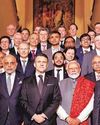Sometimes, prestigious awards are best left unawarded, especially when the quality of claimants do not live up to certain standards. This year's Sveriges Riksbank Prize in Economic Sciences, known as the Economics Nobel, was awarded to Daron Acemoglu, Simon Johnson, and James A Robinson, allegedly for advancing our "understanding of the differences in prosperity between nations".
Here are my reasons. One must start with the inherent flaw in how the award is named. The Royal Swedish Academy of Sciences sees the Prize as a recognition of excellence in the "Economic Sciences". Physics is a science, chemistry is one too, and so is biology. But economics is about human responses to economic incentives and penalties, and its success (or failure) follows from an understanding of psychology and sociology. So economics is not a precise science, and no Nobel winner is a scientist of any kind.
Next, given the likely paucity of groundbreaking research—especially as many economic theories, like modern monetary theory, seem to be collapsing under the weight of their own contradictions—the committee seems to find safety in numbers. It awards a bunch of economists and not just one. In the last four years, only once—in 2023—did the Nobel committee award the Prize to a single recipient (Claudia Goldin, who documented women's wages and labor market participation rates over centuries). To be fair, research is often a team effort, but we also must note the tendency to award the prize to multiple recipients at the same time.
Diese Geschichte stammt aus der November 06, 2024-Ausgabe von Business Standard.
Starten Sie Ihre 7-tägige kostenlose Testversion von Magzter GOLD, um auf Tausende kuratierte Premium-Storys sowie über 8.000 Zeitschriften und Zeitungen zuzugreifen.
Bereits Abonnent ? Anmelden
Diese Geschichte stammt aus der November 06, 2024-Ausgabe von Business Standard.
Starten Sie Ihre 7-tägige kostenlose Testversion von Magzter GOLD, um auf Tausende kuratierte Premium-Storys sowie über 8.000 Zeitschriften und Zeitungen zuzugreifen.
Bereits Abonnent? Anmelden
Montek Ahluwalia bats for smaller states to drive economic growth
Montek Singh Ahluwalia, economist and former deputy chairman of the erstwhile Planning Commission of India, has pitched for creation of new cities by carving out new states to drive urbanisation and fuel economic growth.
Plain tales of green entrepreneurship
A volume of startup tales in India can often be shallow, thinly disguised hagiographies offering no real insights or useful information.

ONGC-NTPC Green JV acquires Ayana Renewable for ₹19.5K cr
NIIF-backed firm has 4 GW of operational and under-construction assets

MSME pharma units get 1-yr breather to adopt Schedule M standards
The government has given one-year breather to small-and-medium sized pharma units with annual turnover of less than ₹250 crore to comply with the revised Schedule M standards which seek to set quality standards and good manufacturing practices.

Modi, Macron for Enhancing Investment Ties
Prime Minister Narendra Modi and French President Emmanuel Macron on Wednesday called for enhancing trade and investment ties between the two countries and committed to further deepening their engagement in the Indo-Pacific and various global forums and initiatives.

Businesses bank on love with Valentine's Day shopping boom
With Valentine's Day around the corner, love is in the air - and so are discounts, as couples shop for their special someone.
Gaekwad gets a day's extension from SC to deposit ₹600 crore
Contempt plea against Saluja withdrawn

Rajnath Urges Pvt Sector to Lead Defence Manufacturing
The time has come for the private industry to take a lead in India's defence manufacturing sector, Defence Minister Rajnath Singh said at Aero India 2025 in Bengaluru on Wednesday, less than two weeks after the Union Budget allocated ₹27,886 crore for acquiring weapons and systems from domestic private players.
PM Meets Pichai
Prime Minister Narendra Modi met Google CEO Sundar Pichai on the sidelines of the AI Action Summit in Paris where they discussed the \"incredible opportunities\" AI would bring to India.

US Prez says lower interest rates would go hand-in-hand with tariffs
Govt agencies to work with Musk's team to identify reductions in workforce
